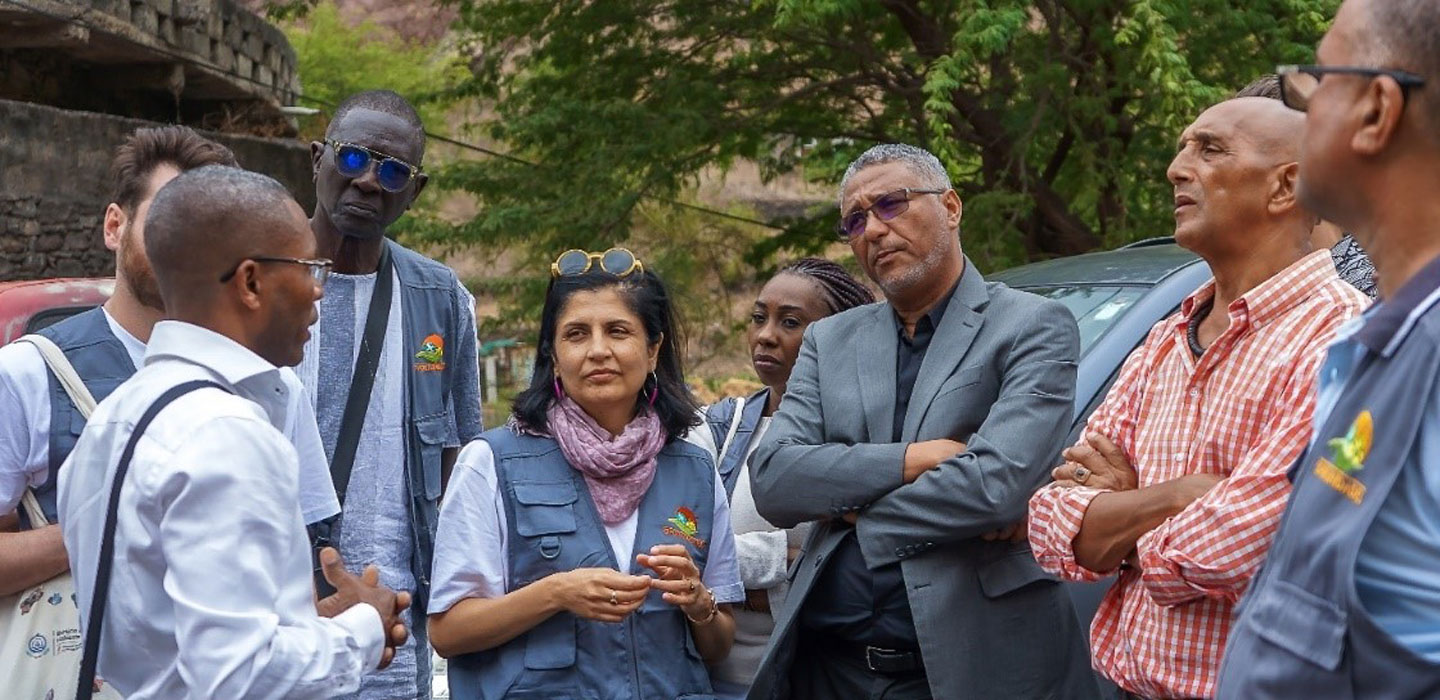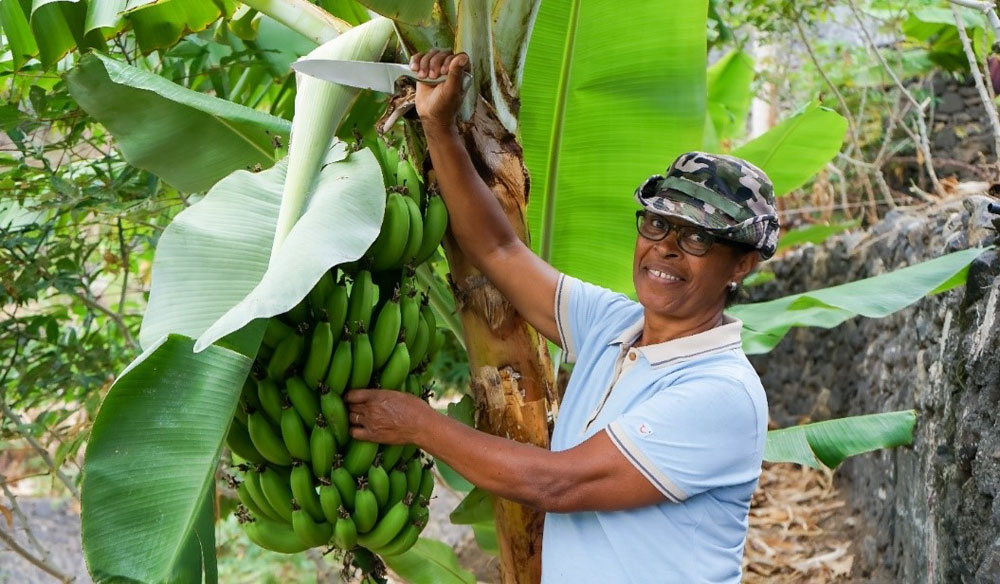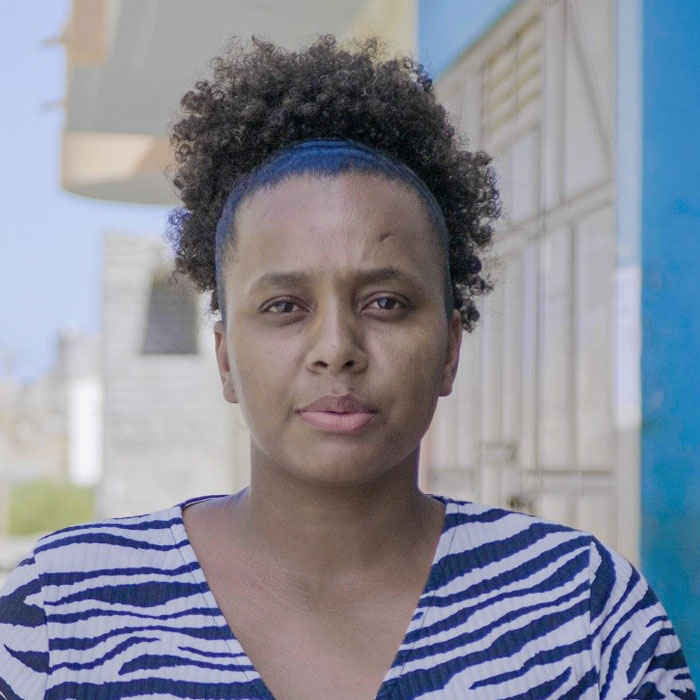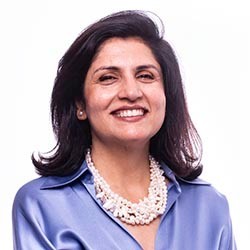Cabo Verde is small in size but not in ambition
IFAD Asset Request Portlet
Asset Publisher
Cabo Verde is small in size but not in ambition
By Jyotsna Puri

Jo Puri and Cabo Verde’s Minister of Agriculture and Environment, Gilberto Silva, speak to rural people who have benefited from a photovoltaic water pumping system in Boca Coruja, Cabo Verde.
I kicked off my mission to Africa’s western-most island, Cabo Verde, with two goals in mind: discuss the future of the archipelago with the country’s leadership and hear from the rural people IFAD supports about how we can improve their lives.
In particular, I was eager to speak with participants from the Rural Socio-economic Opportunities Programme (POSER). Implemented in 2013, the programme has yielded impressive results, including financing more than 400 microprojects and benefiting about 12,000 producers, almost half of whom are women.
Despite its success, POSER has faced challenges. The weakest link in Cabo Verde has always been water, so in 2017, its focus shifted from finance to building reliable water-related infrastructure and creating jobs.
Vulnerable country, stable government
Despite its name, the ten-island archipelago is arid and water starved. In fact, only 10 per cent of Cabo Verde is arable land. With farming, pastoralism and forestry affected by ongoing drought and water shortages, it’s incredible that anything grows here at all.
But Cabo Verde also has a lot going for it, including a stable government, high literacy rates, commitment to building technology and data systems, and government plans to invest in marine ecosystems and the blue economy.
 |
| Banana and cassava producer, Marina Nathalia Delgado, is a POSER participant in San Antão, Cabo Verde. ©IFAD/POSER/Sergio Da Luz |
Together with the Minister of Agriculture and Environment, Gilberto Silva, and IFAD’s Country Director, Haoua Sienta, we met people from the high slopes of San Antão to the sandy beaches of Porto Novo.
They told us how borewells and solar-powered water systems improved their access to water. This enabled them to grow different kinds of foods—including banana, potatoes and cassava—and improve their nutrition, while the number of cropping seasons increased.
Marina Nathalia Delgado, a banana and cassava producer, put it this way: “thanks to the infrastructure installed by the project, not only do I no longer have problems with access to water but my production has increased and allows me to have enough food to feed my family.”
The women of Cabo Verde are determined. “I say to all the women who have the strength and courage to work in agriculture, that it's a job like any other, and that we women are perfectly capable of doing it,” was the message from IFAD project participant, Janícia Monteiro da Luz.
 |
| IFAD project participant, Janícia Monteiro da Luz. © Oteldino Carvalho |
The role of leadership
I also had the privilege of meeting Prime Minister Ulisses Correia e Silva and the Deputy Prime Minister of Finance, Business Promotion and Digital Economy, Garcia Correia and assured them that IFAD stood ready to support initiatives, like climate funds for sustainable tourism and energy.
By 2030, the government aims to reduce poverty from 28 per cent to 20 per cent and plans to further engage the private sector in Cabo Verde’s sustainable development plans. It has also prioritized high quality data, and greater social inclusion by identifying locations to scale-up best practices from IFAD-financed projects.
It’s no secret that small island developing states, like Cabo Verde, are particularly vulnerable to climate shocks and have to adapt quickly. They need more investment to help them access markets, be productive and reduce indebtedness. Yet they also bring comparative advantages—stable governments, a commitment to fighting inequality and a courage that only small islanders possess.
Publication date: 08 June 2023